Men may be from Mars, but they might want to visit Venus, especially if they want to live longer. According to statistics, the average life expectancy for males is 70 years, whereas it’s 75 years for females.
Now, while women are more likely to get older, that doesn’t necessarily mean that they’re aging faster. In fact, a recent study has revealed that while women may have longer life expectancies, it’s the men that are aging faster biologically.
The Battle of the (Aging) Sexes
We’re all going to age, but that doesn’t mean that we’ll age at the same rate. Biological aging refers to the rate at which your body ages on a cellular level and how this rate, if accelerated, may increase your risk of chronic diseases. A low biological age at a high chronological age is a great sign of longevity, with many seniors being “young at heart.”
Now, back to the battle of the sexes. In Finland, women typically live five longer years than men. So, in an effort to better understand the sex gap in life expectancy, Finnish researchers set out to see if biological aging was responsible for this gap.
Biological Aging in Women and Men
For the study, published in The Journals of Gerontology, the researchers examined a set of 2 240 twins that had been placed in two age groups: one with twins between 21 and 42 years of age and the other with twins between 50 and 76.
They then used four different epigenetic clocks to measure their biological age. The team of researchers also analyzed the participants’ BMI and lifestyle habits, which include smoking, drinking, and physical activity.
“We found men are biologically older than women of the same chronological age, and the difference is considerably larger in older participants. We observed a sex difference in aging pace, which was not explained by lifestyle-related factors.” – Anna Kankaanpaa, lead author of the study.
The study also found that male bodies are four biological years older than the bodies of females of the same age.
What’s Making Men Age Faster?
The study noted that the older male twins were more likely to be frequent smokers. Smoking can be detrimental to your health in so many ways, and it’s also been found to age you at an alarming level.
A study published in Scientific Reports reported that female smokers were likely to be twice as old as their chronological age compared to nonsmokers. In regards to male smokers, they were likely to be one and a half times as old as their chronological age compared to nonsmokers.
The Finnish researchers of the biological aging study also pointed out that the decline in smoking among men may partly explain why the sex gap in life expectancy has narrowed in recent decades.
However, smoking habits amongst men only explain the aging sex gap in older male twins, not younger adult twins. Kankaanpää added that the researchers did note a sex difference in the aging pace that “was not explained by lifestyle-related factors”.
“A similar difference was also observed among these pairs of twins. The male sibling was about one year biologically older than his female co-twin. These pairs have grown in the same environment and share half of their genes. The difference may be explained, for example, by sex differences in genetic factors and the beneficial effects of the female sex hormone estrogen on health.” says Kankaanpää.
How does estrogen improve longevity?
Telomeres are protective caps found at the end of a chromosome, and they are seen as a “biological clock”.
While telomeres do shorten as we age, their shortening at an accelerated rate is concerning. In fact, prematurely shortened telomeres have been linked to increased all-cause mortality risk in the general population.
Therefore, it’s important to ensure that telomeres shorten at a healthy rate, especially if we want to protect our longevity. That said, it appears that women are more likely to have better telomeric health, and this may be thanks to the presence of estrogen in their bodies.
Elissa Epel, Ph.D., is a researcher and professor in the department of psychiatry at the University of California. In a keynote address at the North American Menopause Society (NAMS) Annual Meeting in 2018, she revealed that experimental studies suggest estrogen exposure increases the activity of telomerase, an enzyme that can protect and elongate telomeres.
Granted Epel’s research is not enough for the FDA to declare estrogen as an anti-aging drug. However, it is an avenue that longevity researchers continue to look into.
Takeaway
Aging is an inevitable process, but there’s no reason why we have to speed it up at a cellular level. Unfortunately, it appears that men seem to be winning that race, risking their longevity. That said, if they want to ensure that they live a long and healthy life, here are a few things that we suggest they learn.
MAIN IMAGE CREDIT:Irzhanova Asel/Shutterstock
References
Kankaanpää, A., Tolvanen, A., Saikkonen, P., Heikkinen, A., Laakkonen, E. K., Kaprio, J., Ollikainen, M., & Sillanpää, E. (2022). Do Epigenetic Clocks Provide Explanations for Sex Differences in Life Span? A Cross-Sectional Twin Study. The journals of gerontology. Series A, Biological sciences and medical sciences, 77(9), 1898–1906. https://doi.org/10.1093/gerona/glab337
Mamoshina, P., Kochetov, K., Cortese, F. et al. Blood Biochemistry Analysis to Detect Smoking Status and Quantify Accelerated Aging in Smokers. Sci Rep 9, 142 (2019). https://doi.org/10.1038/s41598-018-35704-w
Wang, Q., Zhan, Y., Pedersen, N. L., Fang, F., & Hägg, S. (2018). Telomere Length and All-Cause Mortality: A Meta-analysis. Ageing research reviews, 48, 11–20. https://doi.org/10.1016/j.arr.2018.09.002





![women [longevity live]](https://longevitylive.com/wp-content/uploads/2020/01/photo-of-women-walking-down-the-street-1116984-100x100.jpg)










